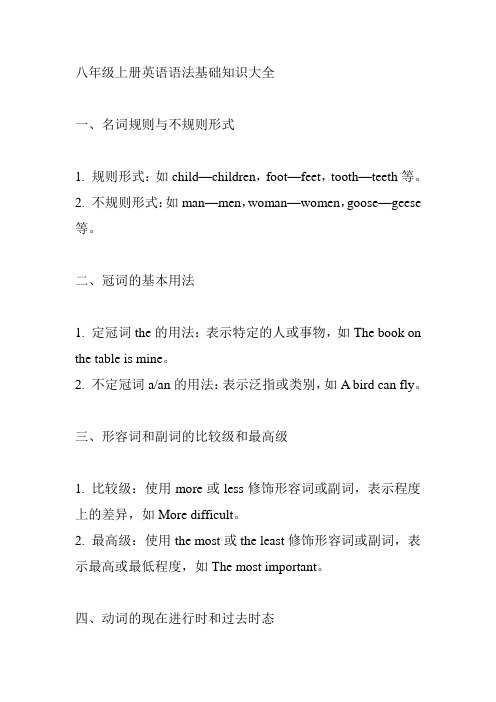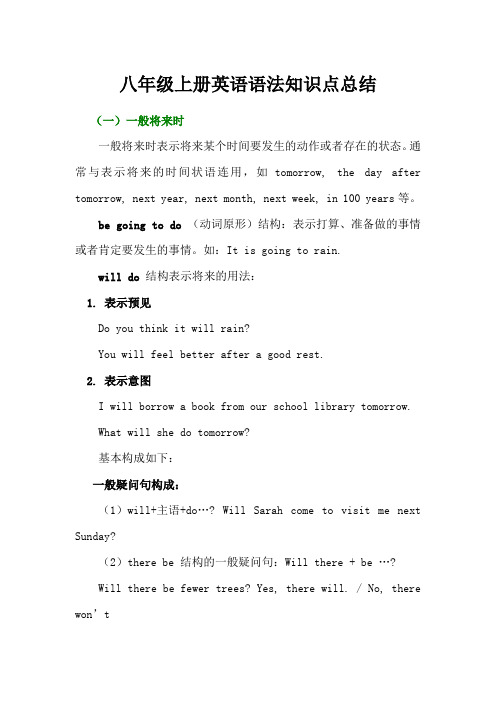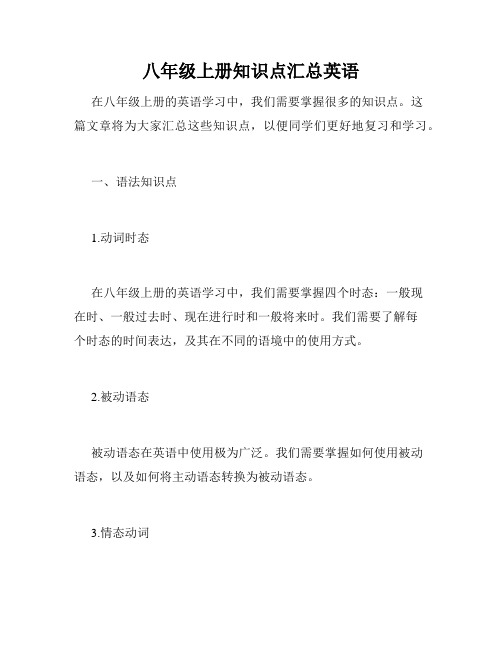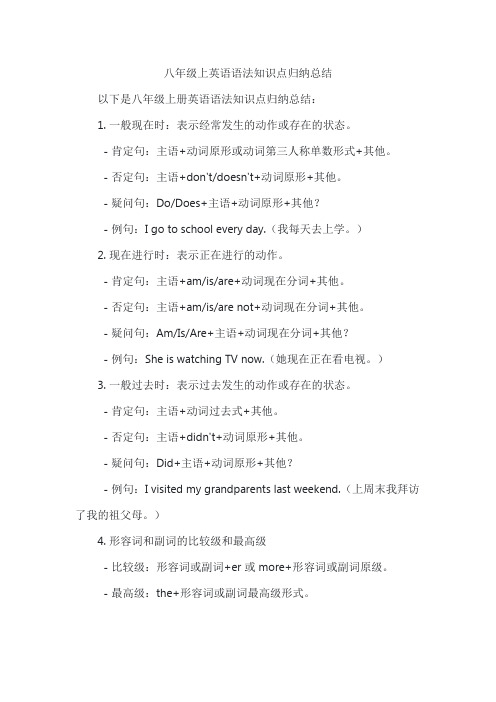初二上册英语语法知识点总结.
人教版八年级上册英语语法、短语和知识点总结归纳

人教版八年级上册英语语法、短语和知识点总结归纳一、语法1. 一般现在时- 用法:表示经常性或惯性的动作或状态。
- 结构:主语 + 动词原形 (+ 其他成分)- 示例:I play soccer every weekend.2. 一般过去时- 用法:表示过去某个时间点或一段时间内发生的动作或存在的状态。
- 结构:主语 + 动词过去式 (+ 其他成分)- 示例:She watched a movie last night.3. 现在进行时- 用法:表示现在正在发生的动作。
- 结构:主语 + am/is/are + 动词-ing (+ 其他成分)- 示例:They are studying for the exam.4. 现在完成时- 用法:表示动作或状态发生在过去某个时间点,但与现在有关。
- 结构:主语 + have/has + 动词过去分词 (+ 其他成分)- 示例:I have finished my homework.5. 情态动词- 用法:表示能力、意愿、可能性等。
- 常见的情态动词有 can, could, may, might, must, should, ought to 等。
- 示例:He should go to bed early.二、短语1. as well as- 用法:表示两个事物同时存在或发生。
- 示例:She can speak English as well as Chinese.2. in order to- 用法:为了做某事。
- 示例:They woke up early in order to catch the train.3. by the way- 用法:用于引入一个新的话题或问题。
- 示例:By the way, have you seen the latest movie?三、知识点1. 直接引语和间接引语- 直接引语:用引号括起来的原话。
- 间接引语:将直接引语转述为陈述句或疑问句。
八年级上册英语语法基础知识大全

八年级上册英语语法基础知识大全一、名词规则与不规则形式1. 规则形式:如child—children,foot—feet,tooth—teeth等。
2. 不规则形式:如man—men,woman—women,goose—geese 等。
二、冠词的基本用法1. 定冠词the的用法:表示特定的人或事物,如The book on the table is mine。
2. 不定冠词a/an的用法:表示泛指或类别,如A bird can fly。
三、形容词和副词的比较级和最高级1. 比较级:使用more或less修饰形容词或副词,表示程度上的差异,如More difficult。
2. 最高级:使用the most或the least修饰形容词或副词,表示最高或最低程度,如The most important。
四、动词的现在进行时和过去时态1. 现在进行时态:表示正在进行的动作或状态,结构为be + -ing形式,如I am studying。
2. 过去时态:表示过去的动作或状态,结构为动词的过去式,如I studied。
五、被动语态的使用1. 被动语态表示主语是动作的接受者,常用by引导的行为主体,如She was seen by him。
2. 被动语态的构成:be + 过去分词,如The book was written by him。
六、条件状语从句和时间状语从句1. 条件状语从句:表示假设条件,常用if或unless引导,如If you study hard, you will succeed。
2. 时间状语从句:表示时间上的先后关系,常用when、while、as等引导,如When he comes, I will tell him the news。
七、并列句和复合句的结构1. 并列句:由并列连词and、or等连接的句子,结构相对简单,如I like apples and she likes bananas。
八年级上册英语语法知识点总结

八年级上册英语语法知识点总结(一)一般将来时一般将来时表示将来某个时间要发生的动作或者存在的状态。
通常与表示将来的时间状语连用,如tomorrow, the day after tomorrow, next year, next month, next week, in 100 years等。
be going to do(动词原形)结构:表示打算、准备做的事情或者肯定要发生的事情。
如:It is going to rain.will do结构表示将来的用法:1. 表示预见Do you think it will rain?You will feel better after a good rest.2. 表示意图I will borrow a book from our school library tomorrow. What will she do tomorrow?基本构成如下:一般疑问句构成:(1)will+主语+do…? Will Sarah come to visit me next Sunday?(2)there be 结构的一般疑问句:Will there + be …?Will there be fewer trees? Yes, there will. / No, there won’t否定句构成:will + not (won’t)+doSarah won’t come to visit me next Sunday.特殊疑问句构成:特殊疑问词+will+主语+…?What will Sarah do next Sunday?练一练根据例句,用will改写下列各句例:I don’t feel well today. (be better tomorrow)I’ll be better tomorrow.1. Gina has six classes today. (have a lot of homework tonight)_____________________________2. I’m tired now. (sleep later)_____________________________3. My parents need a new car. (buy one soon)_____________________________4. We can’t leave right now. (leave a little later)_____________________________5. The weather is awful today. (be better tomorrow)_____________________________答案:1. She’ll have a lot of homework tonight.2. I’ll sleep later.3. They’ll buy one soon.4. We’ll leave a little later.5. Maybe it’ll be better tomorrow.(二)should的用法:should用来提出建议和忠告,后边加动词原形,否定句直接在should后边加not.例如:I think you should eat less junk food.我认为你应该少吃垃圾食品。
八年级上册知识点汇总英语

八年级上册知识点汇总英语在八年级上册的英语学习中,我们需要掌握很多的知识点。
这篇文章将为大家汇总这些知识点,以便同学们更好地复习和学习。
一、语法知识点1.动词时态在八年级上册的英语学习中,我们需要掌握四个时态:一般现在时、一般过去时、现在进行时和一般将来时。
我们需要了解每个时态的时间表达,及其在不同的语境中的使用方式。
2.被动语态被动语态在英语中使用极为广泛。
我们需要掌握如何使用被动语态,以及如何将主动语态转换为被动语态。
3.情态动词情态动词是一种特殊的动词形式,包括can、could、may、might、must、shall、should、will和would等。
我们需要了解每个情态动词的意义和用法。
4.虚拟语气虚拟语气用于表达可能的假设、愿望、虚拟的情况、建议等。
我们需要学会使用虚拟语气,并注意不同情况下的使用方式。
二、单词和词组知识点1.常用动词和形容词在八年级上册的英语学习中,我们需要掌握一些常用的动词和形容词。
例如:finish、like、enjoy、happy、sad、angry等。
这些单词经常出现在日常生活中,因此我们需要熟练掌握它们。
2.常用词组熟练掌握一些常用词组对于我们的英语学习是非常有帮助的。
例如:take care of、look forward to、work on、pay attention to等。
这些词组在我们的英语表达中使用频率较高,因此我们需要注意学习它们的用法。
3.其他单词和词组在八年级上册的英语学习中,我们还需要学习一些其他的单词和词组。
例如:transportation、entertainment、wildlife、historic sites、directions等。
这些单词和词组与生活中的各个方面相关,我们需要在学习它们的同时了解它们的实际意义和使用场合。
三、阅读理解知识点1.注意细节在进行阅读理解时,我们需要注意细节。
这包括阅读材料的文字表述、时间和地点等信息,以及与阅读内容相关的语言技能。
人教版八年级英语上册语法总结

人教版八年级英语上册语法总结一、一般现在时。
1. 概念。
- 表示经常或习惯性的动作或状态;表示客观事实或普遍真理。
- 例如:I often get up at six o'clock.(经常的动作)- The earth goes around the sun.(客观真理)2. 动词形式。
- 当主语是第三人称单数(he/she/it等)时,动词要加 -s或 -es。
- 一般情况加 -s,如:like - likes;以s, x, ch, sh, o结尾的动词加 -es,如:go - goes, watch - watches;以辅音字母 + y结尾的动词,把y变为i再加 -es,如:study - studies。
- 当主语不是第三人称单数时,动词用原形。
例如:They play football every day.3. 句型结构。
- 肯定句:主语+动词(原形/第三人称单数形式)+其他。
- 否定句:主语+don't/doesn't+动词原形+其他。
(do not = don't,does not = doesn't)- 一般疑问句:Do/Does+主语+动词原形+其他?回答:Yes, 主语+do/does. No, 主语+don't/doesn't.二、一般过去时。
1. 概念。
- 表示过去某个时间发生的动作或存在的状态。
- 例如:I went to the park yesterday.2. 动词形式。
- 一般动词在词尾加 -ed,如:play - played;以不发音的e结尾的动词加 -d,如:live - lived;以重读闭音节结尾且末尾只有一个辅音字母的动词,双写这个辅音字母再加 -ed,如:stop - stopped;以“辅音字母 + y”结尾的动词,把y变为i再加 -ed,如:study - studied。
还有一些不规则动词,如:go - went, see - saw等。
八年级上英语语法知识点归纳总结

八年级上英语语法知识点归纳总结以下是八年级上册英语语法知识点归纳总结:1. 一般现在时:表示经常发生的动作或存在的状态。
- 肯定句:主语+动词原形或动词第三人称单数形式+其他。
- 否定句:主语+don't/doesn't+动词原形+其他。
- 疑问句:Do/Does+主语+动词原形+其他?- 例句:I go to school every day.(我每天去上学。
)2. 现在进行时:表示正在进行的动作。
- 肯定句:主语+am/is/are+动词现在分词+其他。
- 否定句:主语+am/is/are not+动词现在分词+其他。
- 疑问句:Am/Is/Are+主语+动词现在分词+其他?- 例句:She is watching TV now.(她现在正在看电视。
)3. 一般过去时:表示过去发生的动作或存在的状态。
- 肯定句:主语+动词过去式+其他。
- 否定句:主语+didn't+动词原形+其他。
- 疑问句:Did+主语+动词原形+其他?- 例句:I visited my grandparents last weekend.(上周末我拜访了我的祖父母。
)4. 形容词和副词的比较级和最高级- 比较级:形容词或副词+er 或 more+形容词或副词原级。
- 最高级:the+形容词或副词最高级形式。
- 例句:She is the most beautiful girl in our class.(她是我们班最漂亮的女孩。
)5. 情态动词:表示能力、许可、请求、义务等。
- 肯定句:主语+情态动词+动词原形+其他。
- 否定句:主语+情态动词 not+动词原形+其他。
- 疑问句:情态动词+主语+动词原形+其他?- 例句:You must finish your homework before watching TV.(你必须在看电视之前完成你的家庭作业。
)6. 不定代词:不指明代替任何特定名词或形容词的代词。
八年级上册英语重点语法归纳

八年级上册英语重点语法归纳一、一般过去时。
1. 概念:表示过去某个时间发生的动作或存在的状态。
2. 标志词:yesterday(昨天), last week(上周), last month(上个月), last year(去年), two days ago(两天前), in 1990(在 1990 年)等。
3. 构成:- 主语 + was / were + 其他(主语是第一人称 I 和第三人称单数用 was,其他人称用 were)- 主语 + 动词的过去式 + 其他。
4. 动词过去式的构成规则:- 一般在动词末尾加 -ed,如:play - played。
- 结尾是 e 的动词加 -d,如:like - liked。
- 重读闭音节词,双写末尾辅音字母再加 -ed,如:stop - stopped。
- 以辅音字母 + y 结尾的动词,变 y 为 i 再加 -ed,如:study - studied。
二、频度副词。
1. 常见的频度副词有:always(总是), usually(通常), often(经常), sometimes(有时), seldom(很少), never(从不)2. 频度副词在句中的位置:通常放在实义动词之前,be 动词、助动词或情态动词之后。
三、形容词和副词的比较级和最高级。
1. 比较级的构成规则:- 一般在词尾加 -er。
- 以不发音的 e 结尾的词加 -r。
- 重读闭音节词,双写末尾辅音字母再加 -er。
- 以“辅音字母 + y”结尾的词,变 y 为 i 再加 -er。
- 多音节词和部分双音节词在前面加 more。
2. 最高级的构成规则:- 一般在词尾加 -est。
- 以不发音的 e 结尾的词加 -st。
- 重读闭音节词,双写末尾辅音字母再加 -est。
- 以“辅音字母 + y”结尾的词,变 y 为 i 再加 -est。
- 多音节词和部分双音节词在前面加 most。
3. 比较级和最高级的用法:- 比较级用于两者之间的比较,常用 than 连接。
八上语法知识点总结

八上语法知识点总结一、词类1. 名词名词是表示人、事物、地点、动作、状态和抽象概念的词。
名词的复数形式、所有格及不可数名词的用法是重要的知识点。
2. 代词代词用来替代名词。
包括人称代词、物主代词、指示代词、不定代词等。
学习代词的正确使用和变化形式是语法学习中的重点。
3. 形容词形容词用来修饰名词,表示人或物的性质、特征或状态。
掌握形容词的用法和比较级、最高级的构成及用法是重要的语法知识点。
4. 副词副词用来修饰动词、形容词和其他副词,表示时间、地点、程度、方式等。
了解副词的分类及其在句子中的位置是必要的知识。
5. 动词动词表示动作或状态。
学习动词的时态、语态、语气、不定式、动名词、分词等是语法学习中的难点。
6. 介词介词通常用来表示时间、地点、方向、原因等概念。
介词短语作状语、定语、宾语等。
7. 连词连词用来连接词与词、短语与短语、句与句。
常见的连词有并列连词、从属连词和关联副词。
二、句子成分句子成分包括主语、谓语、宾语、表语、定语、状语等。
理解各个成分在句子中的作用和位置是语法学习中的重点。
三、时态时态是动词表示的动作或状态所处的时间。
英语有一般现在时、一般过去时、一般将来时、现在进行时、过去进行时、将来进行时、过去完成时、将来完成时等时态。
掌握时态的构成和用法对英语学习至关重要。
四、语态语态包括主动语态和被动语态。
主动语态表示主语是动作的执行者,被动语态表示主语是动作的承受者。
学习语态的变化和用法是语法学习中的难点之一。
五、语气语气包括陈述语气、疑问语气、祈使语气、虚拟语气等。
了解各种语气的构成和用法是语法学习中的重点内容。
以上是八年级上册常见的语法知识点总结,通过系统的学习和实践运用,能够提高自己的语言表达能力,为更高一级的语法学习奠定坚实的基础。
希望同学们能够认真对待语法学习,不断提高自己的语言能力,从而更好地理解和运用英语。
- 1、下载文档前请自行甄别文档内容的完整性,平台不提供额外的编辑、内容补充、找答案等附加服务。
- 2、"仅部分预览"的文档,不可在线预览部分如存在完整性等问题,可反馈申请退款(可完整预览的文档不适用该条件!)。
- 3、如文档侵犯您的权益,请联系客服反馈,我们会尽快为您处理(人工客服工作时间:9:00-18:30)。
新目标八年级(上)英语复习提纲Unit 1: How often do you exercise?【语言目标】What do you usually do on weekends? I sometimes go to the beachHow often do you eat vegetables? Every day. Most students do homework every day.【应掌握的词组】1.go to the movies 去看电影2. look after = take care of 照顾3.surf the internet 上网4. healthy lifestyle 健康的生活方式5. go skate boarding 去划板6. keep healthy=stay healthy 保持健康7. exercise=take(much)exercise=do sports锻炼8. eating habits 饮食习惯9. take more exercise 做更多的运动10. the same as 与什么相同11. be different from 不同12. once a month一月一次13. twice a week一周两次14. make a difference to 对什么有影响15. how often 多久一次16. although = though虽然17. most of the students=most students 18. shop=go shopping=do some shopping 购物19. as for至于20. activity survey活动调查21. do homework做家庭作业22. do house work做家务事23. eat less meat吃更少的肉24. junk food垃圾食物25. be good for 对什么有益26. be bad for对什么有害27. want to do sth 想做某事28. want sb to do sth想某人做某事29. try to do sth 尽量做某事30. come home from school放学回家31. of course = certainly = sure当然32. get good grades取得好成绩33. some advice 34. hardly=not nearly / almost not几乎不35. keep/be in good health保持健康36.be stressed紧张的,有压力的37. take a vacation 去度假48.get back 回来【应掌握的句子】1. How often do you exercise? 你(你们)多久锻炼一次身体?How often + 助动词do(does或did) + 主语+ do sth.? 疑问词how often是问频率(多久一次),(在这里助动词do(does或did) 是起帮助构成疑问的作用)与一般现在时或一般过去时连用,回答一般是用表示频率的副词,如:once, twice, three times…, sometimes, often, quite, often, never, every day, once a week ,twice a month , three times a month , three or four times a month 等。
2. “What do you usually do on weekends?” “ I usually play soccer.”“周末你通常做什么?”“我通常踢足球。
”第一个do为助动词, 在这起帮助构成疑问的作用;而第二个do则是实义动词。
3. “What’s your favorite program?”“It’s Animal World.”“你最喜欢什么节目?”“动物世界。
”4. As for homework , most students do homework every day .as for...意思是“至于;关于”,常用于句首作状语,其后跟名词、代词或动词的-ing形式(即动名词)。
5. Mom wants me to get up at 6:00 and play ping-pong with her .want to do sth. 意思是“想要做某事”;want sb. to do sth.意思是“想要某人做某事”。
6. She says it’s good for my health.be good for...表示“对……有益(有好处)”;其反义为:be bad for...。
(这里for 是介词,后跟名词、代词或动名词)7. How many hours do you sleep every night?8. I exercise every day , usually when I come home from school .9. My eating habits are pretty good .pretty相当于very 。
10. I try to eat a lot of vegetables , usually ten to eleven times a week .try to do sth.表示“尽力做某事”,不包含是否成功的意思而try doing sth.表示“(用某一办法)试着去做某事”。
11. My healthy lifestyle helps me get good grades.help sb.(to) do sth.帮助某人做某事12. Good food and exercise help me to study better.better是well的比较级,而不是good的比较级13. Is her lifestyle the same as yours or different? =Is her lifestyle the same as your lifestyleor is her lifestyle different from yours? be the same as … / be different from …14. What sports do you play ?15. A lot of vegetables help you to keep in good health .keep in good health = keep healthy = stay healthy16. You must try to eat less meat .try to do sth.表示“尽力做某事”,不包含是否成功的意思,less是little的比较级17. That sounds interesting.这是“主语+系动词+表语”结构的简单句。
sound(听起来),look(看起来),smell(闻起来),taste(尝起来),feel(觉得),seem(好象),grow(变得),get(变得)等词在英语中可用作系动词,后跟形容词作表语。
Unit 2 What’s the matter?【语言目标】What’s the matter? I have a headache.You should drink some tea. The sounds like a good idea.I have a sore back. That’s too bad . I hope you feel better soon.【应掌握的词组】1. Have a cold 感冒2. sore back 背痛3. neck and neck 并驾齐驱,齐头并进4. I have a stomachache 我胃痛= I have got a stomachache = There is something wrong with my stomach= My stomach hurts = I have (got) a pain in my stomach5. What’s the matter? 怎么了?= What’s the trouble (with you)? = What’s your trou ble?= What’s wrong (with you)?= What’ the matter (with you)? =What has happened to you?= Is there anything wrong (with you)? = what’s up?6. sore throat 咽喉痛7. lie down and rest 躺下休息8. see a dentist 看牙医9. drink lots of water 多喝水10. hot tea with honey 加蜂蜜的热茶11.That’s a good idea 好主意12.That’s too bad 太糟糕了13.I think so 我认为如此14. I’m not feeling well. 我觉得不太舒服= I’m not feeling fine/all right.= I’m feeling ill/sick. =I feel terrible/bad. = I don’t feel well.15. get some rest 多休息16. I have no idea = I don’t know 我不知道17. stressed out 筋疲力尽18. I am tired 我累了He is tired. 他累了19. a healthy lifestyle健康的生活方式20. traditional Chinese doctors传统中医21. a balance of yin and yang阴阳调和22. you have too much yin.你阴气太盛23. to eat a balance diet饮食平衡24. healthy food 健康食品25. stay healthy 保持健康= keep healthy = keep in good health = keep fit26. enjoy oneself (myself, yourself, herself, himself, themselves, ourselves, itself反身代词) 玩得高兴,过得愉快=have a good time = have a wonderful time = have fun27. enjoy sth. =like sth. (名词)喜欢某物, enjoy doing sth.喜欢做某事=like dong sthpractice doing sth.练习做某事,mind doing sth. 介意做某事,finish doing sth.完成某事,give up doing sth.放弃做某事,can’t help doing sth.忍不住做某事,keep ding sth. 坚持做某事. (keep on doing sth. / keep sb. doing sth. )be busy doing sth. 忙着做某事be used to doing sth.习惯于做某事make a contribution to doing sth.为..做贡献go on doing sth. 继续做某事forget doing sth.忘记做某事remember doing sth. 记得做某事spend....(in) doing sth. 花(时间)来做某事prefer doing sth.to doing sth.比起(做...)来更愿意(做...)28. at the moment = now 此刻29. Host family 东道家庭30. Conversation practice会话练习31. I’m sorry to hear that.听到此事我很难过【应掌握的句子】1.What’s the matter? I have a bad cold.2.Maybe you should see a dentist.3.I hope you feel better soon.4.Traditional Chinese doctors believe we need a balance of yin and yang to be healthy.5.Eating Dangshen and Huangqi herbs is also good for this. 6.People who are too stressed out and angry may have too much yang.7.It’s easy to have a healthy lifestyle, and it’s important to eat a balanced diet.8.When you are tired, you shouldn’t go out at night.9.I believe him, but I can’t believe in him.10.I am not feeling very well at the moment.I’m tired and I have a lot of headaches.11.I’m stressed out because my Mandarin isn’t improving.12.I practice playing the piano every day.13.She had finished writing the letter when I went in.14.The doctor asked him to give up smoking.15.Do you mind closing the window?16.Mary couldn’t help laughing at his jokes.17.They kept working though it was raining.Unit 3 What are you doing for vacation?【语言目标】What are you doing for vacation? I’m spending time with my f riends.When are you going? I’m going next week.How long are you staying? We’re staying for two weeks.【应掌握的词组】1. babysit one’s sister 照顾妹妹2. visit one’s grandmother 看望奶奶3. spend time with friends 和朋友们一起度过时光4. visit cousins 看望表弟等5. go to sports camp 去运动野营6. o to the beach 去海滩7. go camping 去野营8. Go shopping 去买东西9. go swimming 去游泳10. go boating去划船11. go skating 去溜冰12. go walking去散步13. go climbing 去登山14. go dancing去跳舞15. go hiking 去徒步远足16. go sightseeing 去观光17. go house-hunting 去找房子18. o on a hike 徒步旅行,go bike riding 骑自行车旅行,go fishing 去钓鱼19. do some shopping 买东西20. do some washing 洗衣服21. do some cooking 作饭22. do some reading 读书23. do some speaking训练口语24. do some sewing 做缝纫活25. that sounds nice 那好极了26. at home 在家27. how about=what about ……怎么样?28. how long 多长时间29. how far 多远30. how often 多长时间一次31. how much, how many 多少32. have a good time =have fun= have a wonderful time= enjoy oneself 玩得高兴,过得愉快33. show sb. Sth.=show sth. to sb.出示某物给某人看give me the book=give the book to me 给我书,pass me the cup=pass the cup to me 把杯子递给我,sell me the house=sell the house to me 把房子卖给我buy me a book =buy a book for me 给我买书,make me a cake = make a cake for me给我做蛋糕34. get back=come back回来35. rent videos租借影碟36. take walks=go for a walk散步37. think about 考虑38. decide on= decide upon决定一个计划39. something different 不同的事情40.a great vacation 一个愉快的假期41. I can’t wait 我等不及了42. the famous movie star 著名的影星43. an exciting vacation 激动人心的假期44. Ask her about her plans 向她询问她的计划ask sb. about sth.向某人询问某事45. forget to do sth. 忘记要做某事forget doing sth. 忘记做过某事【应该掌握的句子】1.What are you doing for vacation? I’m babysitting my sister.2.Who are you going with? I’m going with my parents.3.When is he going camping? He is going on the 12th of February, 2005.4.I’m going to Tibet for a week.5.What are you doing there? I’m going hiking in the mountains.6.Show me your photos when we get back to school.7.Where are you going for vacation? I’m going to Hawaii for vacation.8.What is it like there?11. He thought about going to Greece or Spain, but decided on Canada.12. He is leaving the first week in June and staying until September.13. Please don’t forget to close the door when you leave.14.She couldn’t wait to get home to see he parents.Unit 4 How do you get to school?【语言目标】How do you get to school? I take the bus.How long does it take? It takes 20 minutes.How far is it? It’s 10 miles.【应掌握的词组】1. get to school 到校2. get home 到家3. how about=what about …….怎么样?4. take the subway 乘地铁5. ride a bike 骑自行车6. take the bus乘公共汽车7. take the train乘火车8. take a taxi乘坐出租车9. go in a parent’s car 坐父母的车10. by bike, bike bus, by subway, by taxi, by car, by train (乘坐……车,放在句尾)11. have a quick breakfast 迅速吃早饭12. the early bus 早班车13. how far多远14. take sb. to sp.带某人到某处15. doing sth. takes sb. Some time/ money=It takes sb. some time/money to do sth.=sb. spends some time/money (on sth.)=sb. spends some time/money (in) doing sth.=sth. costs sb. some time/money=sb. pay some money for sth.花费某人多少时间/金钱做某事/某人花费多少金钱/时间做某事16. bus stop公共汽车站,train station火车站,subway station地铁站,bus station客运站17. want to do sth.想做某事18. walk to school 步行上学19. in North America 在北美20. in other parts of the world 在世界的其他地区21. depend on=depend upon 依靠,靠……决定22. not all 不是所有的23. need to do sth.需要做某事24. number of students学生数25. a number of=many 许多number前可用large, great, small修饰其谓语是复数26. the number of….的数量,谓语是单数27. don’t worry(about sth./sb.)别着急(为某人/事担心28. around the world= all over the world世界各地,全世界【应掌握的句子】1. How do you get to school? I walk to school.你是怎样到校的?我步行。
